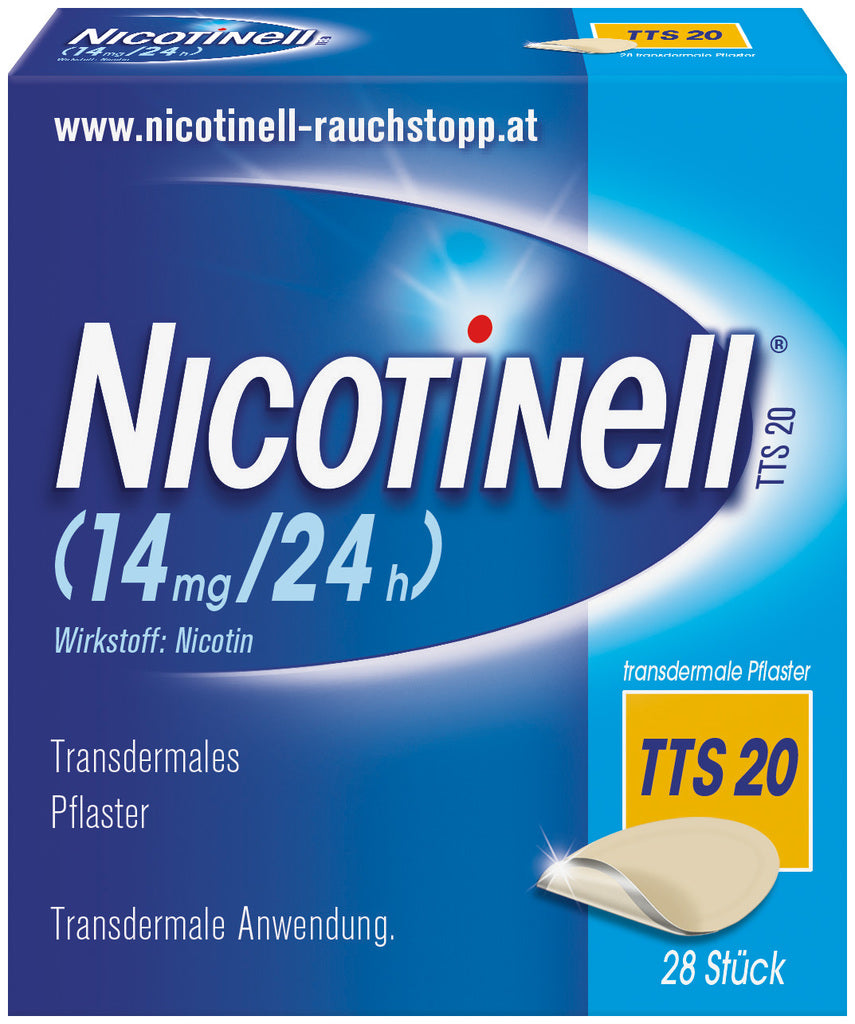Novartis
Nicotinell TTS 20 transdermal patches - 28 pcs
Nicotinell TTS 20 transdermal patches - 28 pcs
Couldn't load pickup availability
Nicotinell belongs to a group of medicines used to help you quit smoking. Nicotinell is a transdermal patch and is similar to a patch that contains the active substance on the side that sticks to your skin. For smokers who want to quit smoking, this nicotine addiction medicine is used to relieve nicotine withdrawal symptoms.
Contraindications
Nicotinell transdermal patch must not be used:
- if you are an occasional or non-smoker
- if you are allergic (hypersensitive) to nicotine or any of the other ingredients of Nicotinell.
If you are not sure whether you can use Nicotinell, ask your doctor or pharmacist for advice.
Take special care with Nicotinell transdermal patch:
Before using Nicotinell, you must check with your doctor if you have recently had a heart attack, have unstable or worsening angina including Prinzmetal's angina, severe heart rhythm problems, uncontrolled high blood pressure or have recently had a stroke.
You should ask your doctor for advice before using Nicotinell:
- if you suffer from stable cardiovascular disease, severe high blood pressure or heart failure,
- if you suffer from problems with blood vessels in the brain or blockage of parts of the arteries,
- if you are diabetic
- if you have an overactive thyroid gland or a tumor of the adrenal gland (phaeochromocytoma),
- if you suffer from severe liver and/or kidney disease,
- if you have an active stomach or duodenal ulcer,
- if you have diseased skin.
The correct dose for an adult can seriously poison or even kill children. It is therefore essential that you keep used and unused transdermal patches out of the sight and reach of children at all times.
After use, fold the patch sticky side in before discarding.
interactions
Quitting smoking and/or Nicotinell can change the way other medicines work and you may not get any benefit from one or both medicines: for example some medicines used to treat asthma, diabetes, schizophrenia, Parkinson's disease, High blood pressure, stomach ulcer, severe pain and angina may require dose adjustment. Please inform your doctor or pharmacist if you are taking/using or have recently taken/used other medicines, even if they are non-prescription medicines.
Pregnancy:
It is very important that you stop smoking during pregnancy as smoking can cause your baby to stun. It can also lead to premature birth and even stillbirth. Ideally, you should try to quit smoking without using any drugs. If you cannot cope, Nicotinell may be recommended to help as the risk to the developing baby is less than the expected risk from continued smoking. Nicotine in any form can be harmful to your unborn baby. Therefore, Nicotinell should only be used after consulting the doctor who is managing your pregnancy, your family doctor or a doctor in a center that specializes in helping people to quit smoking.
Nicotinell, like smoking itself, should be avoided while breastfeeding as nicotine passes into breast milk and can affect your child. If you have not managed to quit smoking, it is better to use chewing gum or lozenges than patches. Nicotinell should only be used during breast-feeding if your doctor has advised you.
application
To successfully quit smoking with this treatment, you must quit smoking completely. Do not use Nicotinell at the same time as other nicotine replacement products such as chewing gum or lozenges unless you are under strict medical supervision.
Nicotinell should not be used by smokers under the age of 18 without a doctor's recommendation.
Three strengths of this medicine are available: Nicotinell 7 mg/24 h, Nicotinell 14 mg/24 h and Nicotinell 21 mg/24 h.
The right strength for you is calculated by the number of cigarettes you smoke each day or by using Fagerstrom's test. This test measures your level of addiction to nicotine. With the result of the test, you are able to select the plaster strength that is right for you.
Open the sachet by cutting with scissors and remove the transdermal patch. Do not cut the Nicotinell transdermal patch. Remove the pre-cut, removable protective liner that is on the side of the transdermal patch. This is the side that contains the active ingredient and comes in contact with your skin.
Immediately after removing the protective liner, place the Nicotinell transdermal patch on an area of dry skin, free from injuries (cuts, scrapes or bruises) and with little body hair: shoulder blade, hip, upper outer surface of the arm, etc. Avoid moving areas of your body such as joints that are vulnerable to friction from clothing.
Place the whole and uncut patch on the skin. To ensure perfect adhesion, press firmly on the entire outer surface of the patch with your palm for at least 10 seconds.
Leave the patch in place for 24 hours. If you have trouble sleeping, ask your doctor or pharmacist for advice. Change the Nicotinell transdermal patch every 24 hours. Also, rotate the application site each day and avoid applying to the same site for a few days if possible.
side effects
Like all medicines, Nicotinell can cause side effects, although not everyone gets them.
Some side effects can be serious
Allergic reactions such as swelling of the skin, face and mouth, low blood pressure and difficulty breathing.
If any of these symptoms occur, remove the patch and tell your doctor.
Some side effects are very common (affects more than 1 in 10 people)
Application site reactions such as itching, redness, swelling and burning. In case of a severe skin reaction that does not go away, stop treatment and ask your doctor or pharmacist to find another form of nicotine replacement to help you quit smoking.
These effects are usually produced if the application site is not rotated daily. By rotating the application site daily, irritation can subside on its own and cause you far less discomfort.
Some side effects are common (affects between 1 and 10 people in 100)
headache, nausea, dizziness, abnormal dreams, muscle pain, difficulty sleeping, restlessness, anxiety, nervousness.
These effects are often mild and wear off on their own and quickly once you remove the patch.
Some side effects are rare (affecting between 1 and 10 in 1,000 people)
disturbance in attention, sleepiness, dramatic mood swings, irritability, depressed mood, confusion, palpitations (feeling your heart beating), vomiting. Aphthous ulcers (painfully inflamed small sores in the lining of the mouth) may be related to quitting smoking and not to your treatment.
composition
The active substance is nicotine.
Each transdermal patch contains 35.0mg of nicotine in a 20cm² patch and delivers a nominal 14mg of nicotine in 24 hours.
The other ingredients are: basic butyl methacrylate copolymer (Eudragit E 100), aluminum-coated polyester film, acrylate-vinyl acetate copolymer (Duro-Tak 387-2516), medium-chain triglycerides (Miglyol 812), paper 26 g/m², siliconized aluminum-coated polyester -Film, brown ink.
Share


